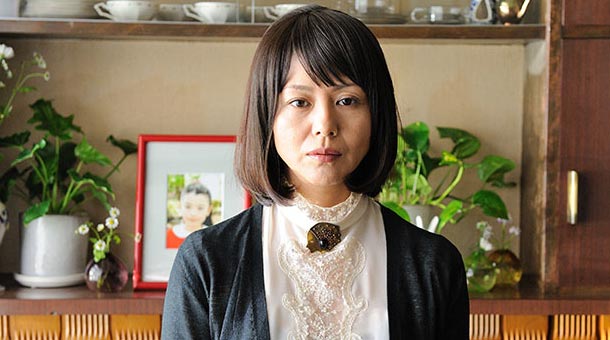TIFF 2012 Day 11: Penance

The last day of TIFF was comprised of only one film for me, but its length could easily make up three separate movies. Kiyoshi Kurosawa’s Penance premiered on TV earlier this year as a 5 part miniseries, and now it’s been compiled into one long 270 minute experience. Kurosawa, who hasn’t made a film since 2008’s Tokyo Sonata, works well with the larger scale that comes with the television format even if it cant really break free from its origins (if you want to see a great example of a miniseries that’s beautifully cinematic check out the late Raul Ruiz’s Mysteries of Lisbon). Penance‘s production values can be distracting at times, and it was clearly designed to be seen over a longer period of time instead of being played all at once.
The central character in Penance is Asako Adachi (Kyoko Koizumi), the wife of a successful businessman and stay at home mom for her daughter Emili. Emili and her friends Sae, Maki, Akiko and Yuko are playing together one day when a man asks Emili to help him. She goes with the man and is found dead hours later by her four friends. The four girls, despite seeing the killer’s face, refuse to give any details which fills Asako with fury as there are no other leads in the case. Asako tells the four girls that one day they will all have to do an act of penance she approves of if they won’t help her find the killer.
The first four episodes each focus on one of the girls 15 years in the future as they coincidentally start finding out what their atonement will be. Sae marries a young wealthy man only to become more of a prisoner than a wife. Maki, now a teacher, is consumed with guilt over Emili’s death and tries to redeem herself. Akiko is a shut-in who discovers a dark secret in her family, and Yuko obsesses over her brother-in-law. Each chapter operates as a stand-alone story, with Asako serving as the connective tissue. It comes as a surprise that these four segments are all consistently good. There’s a running theme involving the four women being oppressed either externally (usually a male villain) or internally (their remorse over Emili’s murder) which Kurosawa explores in various ways. The only exception would be Yuko who selfishly hurts the people around her with no sense of morals (this is also the lightest chapter, operating more as a dark comedy).
It’s unfortunate then that, after the first four engrossing chapters, the final act doesn’t stick the landing. The fifth chapter finally puts the focus on Asako as she hunts down her child’s killer to get revenge. While it wraps everything up in a nice bow, the answers are far from satisfying and end up making this the worst part of Penance. Plot twist after plot twist are thrown in until it feels like soap opera territory, and even during the climactic confrontation the pace started to drag. It’s an unsatisfying and cliched ending, but luckily the bulk of Penance is absorbing enough to make up for its shortcomings. Kurosawa still has a great eye, even with the murky look that dominates the majority of the film. All five leads do a great job with Koizumi being the obvious highlight along with Sakura Ando as Akiko. Penance is definitely a well-made film despite its flaws, but it should probably stay on smaller screens as good TV.
RATING: 7/10 (7.5 for chapters 1-4, 6 for chapter 5)

Penance
And with that, my TIFF coverage for 2012 ends. All in all it was a good experience, with 14* films seen in 7 days (not consecutively). Like every year, I usually end each festival waiting for next September to roll around so I can try to see even more films than before. Here’s hoping for a great TIFF 2013.
* Technically 15 but since I didn’t finish Spring Breakers I won’t count it
Recap of some of my Tweets from today:
Follow @WayTooIndie for full coverage of the 2012 Toronto International Film Festival!
Alright, PENANCE is about to begin. See you all in 5 hours #TIFF12
— Way Too Indie (@WayTooIndie) September 16, 2012
PENANCE: Engrossing but a flawed final act drags things down to soap opera territory. #TIFF12
— Way Too Indie (@WayTooIndie) September 16, 2012
It was a fun 4 hours and 47 minutes though!
— Way Too Indie (@WayTooIndie) September 16, 2012
